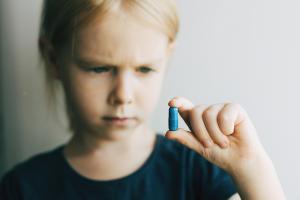CCHR critiques plan for mental health screening of all Americans aged 8-18 for anxiety and depression, which it says will add to psychiatric child drugging
LOS ANGELES, CALIFORNIA, UNITED STATES, October 24, 2022 /EINPresswire.com/ — A recommendation for all American children ages 8 to 18 to undergo mental health screening for anxiety and depression has been lambasted by the mental health industry watchdog, Citizens Commission on Human Rights International as irresponsible and dangerous. A panel of medical experts recommended that primary care doctors screen all children for mental disorders, but the screening questionnaires are often influenced by pharmaceutical companies that manufacture psychotropic drugs or by psychiatrists with conflicts of interest with drug makers. It is a scientific deception than can lead to hundreds of thousands more children being prescribed psychoactive drugs or incarcerated in behavioral health centers, CCHR says.
The group adds that mass screening wreaks of a Brave New World society, as Aldous Huxley depicted in his 1932 novel, where a “utopian” but totalitarian society is bent on behavioral control using, as Huxley stated, the “technique of suggestion—through infant conditioning and, later, with the aid of drugs.”
Screening is based on questions that are so subjective that anyone could be wrongly assessed as “mentally disordered.” They evolve from the Diagnostic & Statistical Manual of Mental Disorders (DSM) which is strongly criticized even from within the ranks of psychiatrists because of its unreliability. One questionnaire has been administered as a universal intervention in high schools to identify and treat depression.[1] It is trademarked by the manufacturer of the antidepressant sertraline which has raked in over $30 billion in sales of the drug.
The U.S. Preventive Services Task Force, which made the screening recommendation, also suggested that all American adults under the age of 65 be screened for anxiety. Treatment would include “medication” which includes sedative-hypnotics that can become addictive within 14 days of taking them and which increase the risk of falls in the elderly.
Experts have warned that “an aggressive approach to screening and treating depression” leads to pathologization of normal human experiences.” Further, “treating normal experiences as pathological undermines our own resiliency and sense of agency, and convinces us we are sick when we are not. Too many people have come to view themselves as defective, and powerless to change their life situations, when this may not be the case,” according to an Assistant Professor of Psychiatry at UCSF Weill Institute for Neurosciences.[2]
The fact that psychiatry has no scientific test, including imaging, to substantiate a diagnosis of any mental disorder is not disclosed in screenings, violating informed consent rights. A study published in Molecular Psychiatry in July made international news when it thoroughly debunked the myth that a chemical imbalance in the brain caused depression—a myth that led to mass antidepressant use.[3]
Raymond Dolan—considered one of the most influential neuroscientists in the world, reported in the journal Neuron: “Despite three decades of intense neuroimaging research, we still lack a neurobiological account for any psychiatric condition. Likewise, functional neuroimaging plays no role in clinical decision making.”[4]
A study by researchers at the University of Liverpool concluded as lead researcher Dr. Kate Allsopp reported: “Although diagnostic labels create the illusion of an explanation they are scientifically meaningless and can create stigma and prejudice.”[5] Professor Peter Kinderman, a co-author, added that the diagnostic system “relies heavily on subjective judgments about what is normal.”
Screening for Attention Deficit Hyperactivity Disorder (ADHD) has come under special criticism. Researchers from the Department of Education, Faculty of Educational Sciences, University of Helsinki, Helsinki, Finland, and Department of Primary Education, Democritus University of Thrace, Greece, noted: “Asserting that ADHD is a neurodevelopmental disorder is a scientific conceit on one hand and reflects the DSM’s political, cultural, and financial role in the psychiatrization of children’s everyday lives on the other.”[6]
They concluded: “like most psychiatric classifications, ADHD is premised on an arbitrary consensus among a small psychiatric community behind the DSM manual rather than on any new scientific breakthroughs. In other words, ‘psychiatrists do not prove things but decide things: they decide what is disordered and what is not….’”
Jan Eastgate, president of CCHR International said: “Mental health screening is not based on science and will only increase the already inexcusable number of American children (and adults) being prescribed mind-altering drugs—more than 6.1 million Americans ages 0-17. The drugs have serious adverse effects that include suicide, homicidal ideation, mania and violence.”
Carl Tishler, an adjunct associate professor of psychology and psychiatry at Ohio State University, said that with millions of children on psychotropics, any time that their doses begin or get increased or decreased, “it may cause a change in emotional state which may reduce impulse control.” This could contribute to suicidal urges.[7]
Such screening can be a gateway to troubled children and teens being incarcerated in behavioral facilities. The New York Times recently reported: “This industry has been voracious in finding struggling teens to pull into its web.… It is unknown “exactly how many children have died at the hands of this industry. One estimate counted 86 deaths from 2000 to 2015. More have died in the years since.”[8]
CCHR is committed to its ongoing work to safeguard children against government-supported intrusive psychiatric screening. Parents can take steps to help protect their children, by signing a Parents’ Rights Form that Provides Opt-Out for School Mental Health Screening
[1] https://jamanetwork.com/journals/jamanetworkopen/fullarticle/2785914
[2] Vivek Datta, “Why Screening Everyone for Depression is a Terrible Idea,” MIA, 29 Jan. 2016, https://www.madinamerica.com/2016/01/why-screening-everyone-for-depression-is-a-terrible-idea/
[3] Joanna Moncrieff, M.D., et al., “The serotonin theory of depression: a systematic umbrella review of the evidence,” Molecular Psychiatry, 20 July 2022, https://www.nature.com/articles/s41380-022-01661-0
[4] https://www.madinamerica.com/2022/10/psychiatrys-hysterical-defense/; Matthew M. Nour, Yunzhe Liu, Raymond J. Dolan, “Functional neuroimaging in psychiatry and the case for failing better,” Neuron, 17 Aug. 2022, https://www.sciencedirect.com/science/article/abs/pii/S089662732200647X
[5] University of Liverpool, “Psychiatric diagnosis ‘scientifically meaningless,’” Science Daily, 8 Jul. 2019, https://www.sciencedaily.com/releases/2019/07/190708131152.htm
[6] Juho Honkasilta and Athanasios Koutsoklenis, “The (Un)real Existence of ADHD—Criteria, Functions, and Forms of the Diagnostic Entity,” Front. Sociol., 30 May 2022, https://www.frontiersin.org/articles/10.3389/fsoc.2022.814763/full
[7] https://www.cchrint.org/2017/07/11/human-rights-group-wants-parents-informed/ citing: Susan Scutti, “‘Alarming’ rise in children hospitalized with suicidal thoughts or actions,” CNN, 5 May 2017, http://www.cnn.com/2017/05/05/health/children-teens-suicide-study/index.html.
[8] “CAN YOU PUNISH A CHILD’S MENTAL HEALTH PROBLEMS AWAY?” New York Times, 11 Oct. 2022, https://www.nytimes.com/interactive/2022/10/11/opinion/teen-mental-health-care.html
Amber Rauscher
Citizens Commission on Human Rights
+1 323-467-4242
email us here
Visit us on social media:
Facebook
Twitter
![]()



